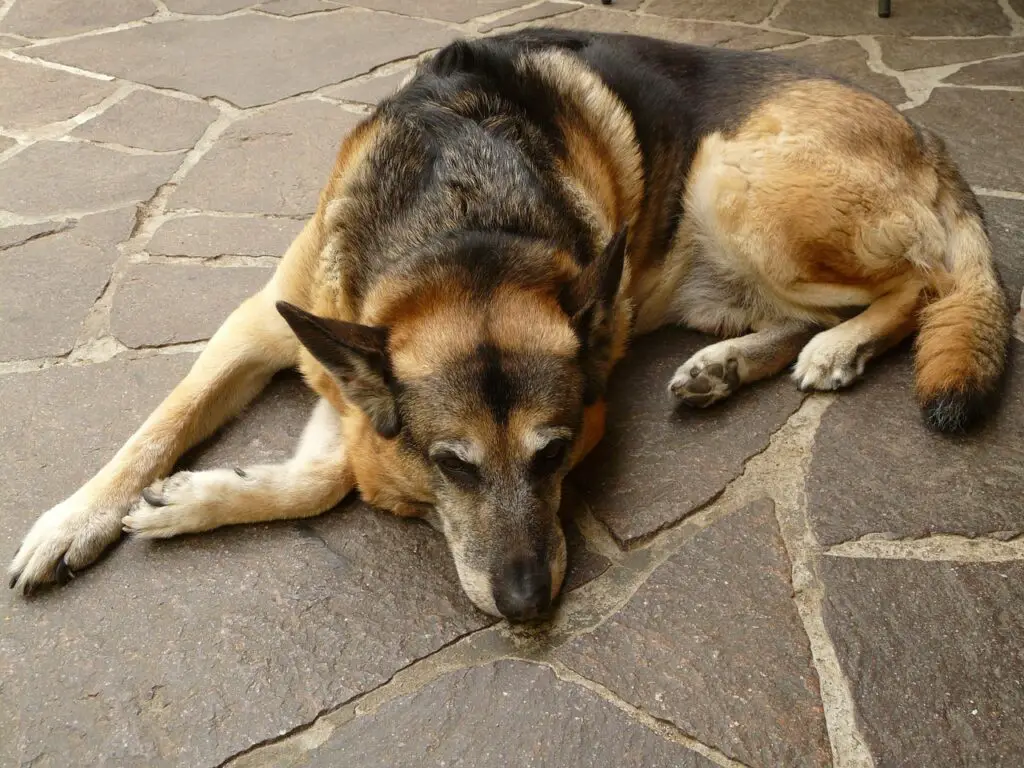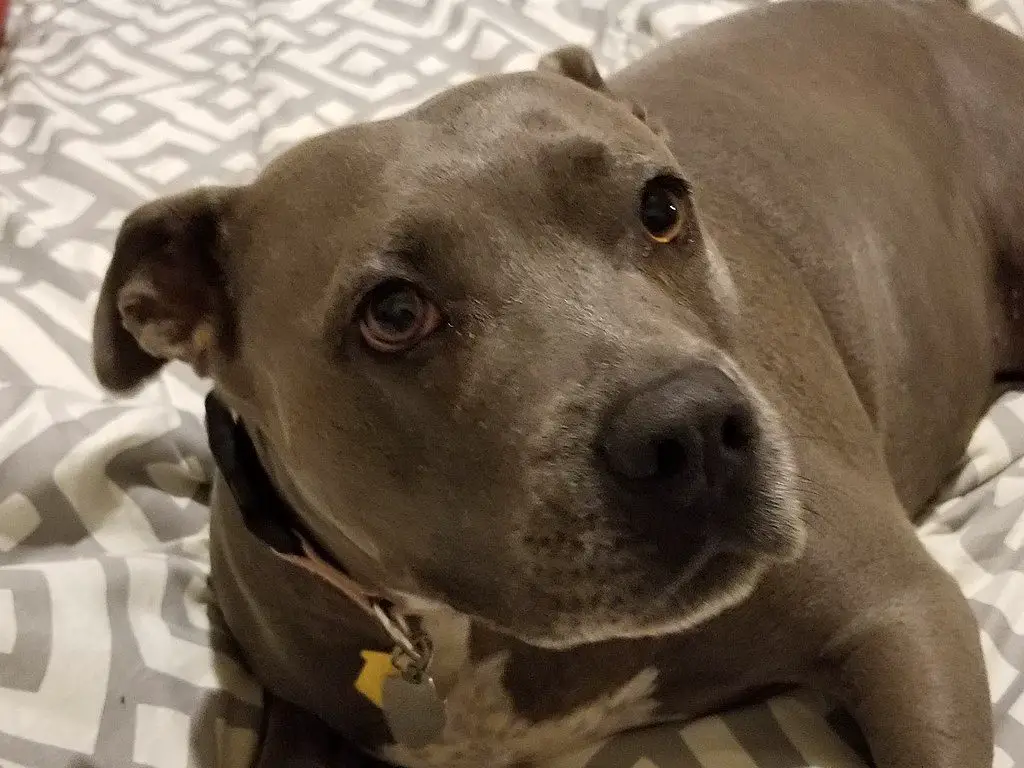Do you have a dog that seems to be walking slow with its head down? If so, there is probably a reason why. In this blog post, we will discuss 12 possible reasons why your dog might be acting this way.
Some of the reasons may surprise you! We will also provide tips on how to correct the issue. So, if you are concerned about your dog’s health or behavior, please keep reading.
- Key Takeaway
- 12 Reasons Why Your Dog Is Walking Slow With Head Down
- Why Is My Dog Suddenly Moving Slowly?
- What Conditions Have Lethargy as a Sign for Dogs?
- What Causes a Dog to Be Lethargic?
- When is Lethargy in Dogs a Cause for Concern?
- Is It Normal For a Dog to Be Lethargic?
- What’s the Difference Between a Lethargic Dog and a Tired Dog?
- FAQs
- Q: Why is my dog walking really slow and looking weak?
- Q: What can I do to help my dog?
- Q: Is it common for this to occur in dogs?
- Q: What are some common causes of slow and weak behavior in dogs?
- Q: Do I need to take my dog to the vet?
- Q: Is it normal for dogs to slow down as they get older?
- Q: What are some reasons why my senior dog may be acting lethargic?
- Q: Should I take my dog to the dog park if they are acting lethargic?
- Q: What are some possible reasons why my dog might become lethargic suddenly?
- Q: Do I need to take my dog to the vet if they are lethargic?
- Q: What are some causes of sudden decrease in energy levels in dogs?
- In Conclusion
A dog walking slow with its head down can be a sign of various issues such as physical pain due to conditions like arthritis or a sprained muscle, neurological disease, inner ear infection, fear, anxiety, or even submission, all requiring veterinary attention.
12 Reasons Why Your Dog Is Walking Slow With Head Down

Do you have a dog that seems to be walking slowly with its head down? Here are 12 reasons why your dog may be doing this:
1. Neck pain
If you’ve ever noticed your dog walking slowly with their head down, there could be a number of reasons why. One possibility is that they’re experiencing neck pain.
This can be caused by a variety of things, including arthritis, joint problems, or even just a simple muscle strain. If your dog is in pain, it may not want to walk as much or as briskly as usual.
There are a few ways a dog can get neck pain. One is from an injury, such as being hit by a car or falling off a cliff. Another way is from arthritis or degenerative disc disease. Finally, neck pain can also be caused by cancerous tumors pressing on the spinal cord or nerves.
If you suspect that neck pain is the issue, it’s best to take them to the vet for an examination. The vet can determine the cause of the pain and prescribe the appropriate treatment.
In some cases, neck pain can be resolved with rest and medication. However, more serious cases may require surgery as per Kingsdale Animal Hospital.
2. Arthritis

Dogs with arthritis often have trouble walking, climbing stairs, and getting up from lying down. They may also be less active than they used to be and sleep more.
As your dog gets older, you may notice that they start to walk a little slower and with its head down. This is a common sign of arthritis, which affects many dogs as they age.
Arthritis is a common condition that affects dogs of all ages, breeds, and sizes. It is a joint disease that causes pain, stiffness, and inflammation in the joints.
In fact, according to Dr. Ajmal from JSAP, arthritis is a change of the inflammatory nature in the synovial membrane.
While it can be frustrating to see your dog in pain, there are things you can do to help ease its discomfort. First, make sure they are getting enough exercise. This will help to keep their joints flexible and prevent further stiffness.
You may also want to consider giving them a supplement that contains glucosamine, which can help to reduce inflammation.
Finally, be sure to provide them with a soft bed or cushion to lie on so they can rest comfortably. With a little care and patience, you can help your dog enjoy a good quality of life even as they age.
3. Neurological disease

A neurological disease is a disorder of the nervous system. The nervous system includes the brain, spinal cord, and nerves. Neurological diseases can affect any part of the nervous system, causing problems with movement, sensation, or even thinking.
If your dog is walking slow with their head down, it may be a sign of neurological disease. This is because the disease can cause weakness and paralysis in the legs, which makes it difficult for your dog to walk. Additionally, the disease can cause pressure on the brain, which can lead to changes in mood and behavior says PetMD.
Some common neurological diseases in dogs include:
- Canine cognitive dysfunction: This condition is similar to Alzheimer’s disease in humans and causes changes in your dog’s mental function and behavior. Symptoms may include disorientation, sleep disturbances, anxiety, and changes in social interaction.
- Epilepsy: This is a seizure disorder that can cause your dog to lose consciousness and have muscle convulsions. Epilepsy can be genetic or caused by other factors such as head trauma or liver disease.
- Canine degenerative myelopathy: This is a progressive disease that affects your dog’s spinal cord and causes weakness and paralysis in the hind legs.
- Intervertebral disc disease: This condition occurs when the discs between your dog’s vertebrae start to deteriorate and can cause pain, weakness, and paralysis.
4. Poor balance

If you ever noticed your dog walking slowly with its head down, it’s not just being lazy – this is actually a sign of poor balance.
Dogs rely on their sense of balance to help them move efficiently, and when they start to lose that ability, it can be difficult for them to get around.
There are many different reasons why a dog might lose its balance, including age-related issues, inner ear infections, and vestibular disease.
What I would do in this situation is I would take my dog to the vet to rule out any serious illness. After any illness is ruled out by the vet, I would try and work on my dog’s balance.
There are a lot of balance exercises that can help your dog regain balance. Plus, make sure that their diet is rich in nutrients as per WebMD.
5. Sensitive to medication
If you’ve noticed that your dog has been walking slow with their head down, there is a chance that your dog is simply adjusting to some new medication.
Many common medications for dogs can have side effects that include lethargy and reduced activity levels. If your dog has recently started taking a new medication, this may be the reason for its change in behavior.
Some common medications that can cause a dog to walk slow with its head down include:
- Antibiotics
- Painkillers
- Anti-inflammatory drugs
- Some heart medications
However, it’s always best to consult with your vet to ensure that there are no underlying health issues. With some time and patience, most dogs will adjust to their new medication and return to their normal activity level says Cornell University College of Veterinary Medicine.
6. Trying to avoid being punished

If your dog is walking slowly with its head down, avoiding eye contact, it might seem like they’re being submissive or feeling guilty, but there’s actually a much simpler explanation. Dogs are very attuned to their owner’s emotions, and they can tell when you’re angry or upset.
When they sense that you’re displeased, they’ll adopt a submissive posture in an attempt to avoid punishment.
This behavior is often seen in puppies who are still learning the rules of the house, but it can also occur in adult dogs who have been scolded for misbehaving. So next time you see your furry friend walking with their head down, remember that they’re just trying to avoid getting into trouble.
7. Might have parasites

A dog might be walking slowly with its head down due to parasites. Parasites are small organisms that live off of other animals, and they can cause a range of health problems in dogs.
Common symptoms of parasitic infection include weight loss, diarrhea, and lethargy. In severe cases, parasites can even lead to death.
There are many different types of parasites that can affect dogs, including fleas, ticks, heartworms, and gastrointestinal worms. While some parasites are more bothersome than others, all of them have the potential to cause health problems for your dog.
That’s why it’s important to be aware of the signs and symptoms of parasites in dogs and to take steps to prevent them from becoming a problem in the first place.
According to Kansas State University, more than 34% of dogs have been infected with parasites in their lifetime.
One of the most common signs that your dog may have a parasite is a change in behavior. For example, if your normally active dog suddenly starts walking slowly with his head down, it could be a sign that he’s not feeling well.
Other behavioral changes that may indicate a parasitic infection include lethargy, loss of appetite, and difficulty breathing. If you notice any of these changes in your dog, it’s important to take him to the vet for a check-up.
At the vet’s office, your dog will likely undergo a physical examination and some basic diagnostic tests, such as a stool sample analysis.
These tests can help to confirm whether or not your dog has a parasitic infection. If parasites are found, your vet will prescribe the appropriate treatment, which may include medication and/or special dietary considerations says WagWalking.
8. Afraid of people or surroundings

Walking your dog should be a peaceful and enjoyable experience for both of you. But if your furry friend seems scared or hesitant, it can be frustrating trying to figure out why.
One possible reason is that your dog is afraid of people or their surroundings. If you notice your dog walking slowly with their head down, it could be a sign that they’re feeling overwhelmed and need some time to adjust.
Try taking them on shorter walks in less crowded areas until they feel more comfortable. With a little patience and understanding, you can help your dog overcome their fear and enjoy walks together again.
9. Scraped his neck
Dogs are wonderful creatures that provide us with companionship, love, and laughter. They are also very active animals that enjoy being out and about, exploring the world around them. However, sometimes our dogs may seem a little sluggish and down in the dumps.
One possible reason for this is that they may have scraped their neck. While this may sound like a minor injury, it can actually be quite painful for your dog. Symptoms of a neck injury include walking slowly with the head down, difficulty chewing or swallowing, and crying or yelping when touched.
To check for a neck injury, gently palpate your dog’s neck and look for any areas of tenderness or swelling. If you find any suspicious areas, it is best to take your dog to the vet for further evaluation.
10. Not socialized properly

As any dog owner knows, a healthy, well-adjusted dog is a joy to be around. Dogs are social creatures by nature, and they thrive on human interaction.
However, dogs that are not properly socialized can become withdrawn and fearful, which can lead to a number of behavioral problems. One of the most common signs of an undersocialized dog is a slow walk with head down.
According to Dr. Tiffani J Howell, the role of early-age socialization in dogs is the key to having a well behaved adult dog.
This behavior is often seen in rescue dogs that have had little contact with humans in their early lives. Dogs that are not properly socialized are often afraid of people and other dogs, and they may try to avoid contact by walking slowly with their head down.
This behavior can be very distressing for both the dog and the owner, but fortunately, it is fairly easy to overcome with patience and training. With time and patience, you can help your dog overcome his fear of people and enjoy a happy, healthy life.
11. It could be just a cold

If your dog is walking slowly with their head down, it could be a sign that they are sick with a cold or fever. While it’s normal for dogs to have a low energy level when they’re sick, you should still take them to the vet to be sure.
A dog’s body temperature is higher than a human’s, so if its nose feels warm to the touch, it could be a sign of a fever. Dogs also tend to get chills when they’re sick, so you may notice them shaking or holding their body close to the ground.
12. Might be only sniffing

If you’ve ever taken your dog for a walk and noticed them walking slowly with their head down, you might have wondered why they’re doing that.
The reason is that they’re exploring. When dogs walk with their nose to the ground, they’re able to take in all kinds of information through their sense of smell says AKC.
They can smell other animals, learn about their surroundings, and even pick up on human emotions.
So the next time you see your dog walking slowly with their head down, don’t worry – they’re just taking in all the sights and smells of the world around them.
Why a Dog Walks Really Slow And Looks Weak

A dog may walk slowly and appear weak due to various reasons such as pain, exhaustion, neurological disease, fear, injury, orthopedic issues, or overexertion.
If a dog is walking really slowly and looks weak, it could be due to several reasons. Pain, exhaustion, or lack of energy could cause a dog to move slowly.
The dog could also be suffering from neurological disease, which can cause weakness and slow movement.
Some dogs might walk slowly because they are tired or simply do not want to be out walking, or in some cases, they might feel sick.
The dog could also be afraid of something, trying to avoid it, or not liking the leash.
There can also be more serious reasons such as hip dysplasia, arthritis flare-up, injury, ligament tear, or other orthopedic issues.
Lastly, lethargy in dogs could occur if they have overexerted themselves, especially in hot weather. It’s important to monitor the dog’s behavior and consult with a veterinarian if the symptoms persist.
Why Is My Dog Suddenly Moving Slowly?

There are many reasons why your dog may be walking slowly. They could be in pain, they could be tired, or they could be sick. There are a few potential illnesses that could cause a dog to walk slowly with their head down.
One possibility is an ear infection, which can be very painful for dogs and make them reluctant to move around too much. Another possibility is arthritis, which is a common condition in older dogs that can cause pain and stiffness in the joints says Dr. Ross Massimiano, DVM.
If your dog is normally active and suddenly starts walking slowly, it’s important to take them to the vet to rule out any medical issues. If there doesn’t seem to be any medical reason for their lethargy, it could simply be that they’re tired or need a break.
Make sure you give your pup plenty of rest stops on walks and make sure their sleeping area is comfortable. If your dog is still moving slowly after a few days of extra rest, it’s time to consult with a veterinarian.
It’s also worth noting that some dogs simply tend to walk slower than others – this is often the case with larger breeds like Newfoundlands or St Bernards. So if your dog falls into this category, there’s no need to worry! As long as they’re otherwise healthy and happy, they’re probably just fine.
What Conditions Have Lethargy as a Sign for Dogs?

Lethargy, or a lack of energy and enthusiasm, can be a sign of various conditions in dogs. Some common conditions that may cause lethargy in dogs include:
- Infections: Bacterial, viral, or fungal infections can cause lethargy as the dog’s immune system fights off the invading pathogens.
- Parasites: Internal parasites (such as worms) or external parasites (like fleas and ticks) can lead to lethargy due to the stress they place on a dog’s body.
- Anemia: A decrease in red blood cells or hemoglobin can result in anemia, which may cause weakness, fatigue, and lethargy in dogs.
- Hypothyroidism: An underactive thyroid gland can lead to a reduction in metabolism and energy levels, causing lethargy and weight gain in dogs.
- Diabetes: Dogs with diabetes may experience lethargy due to fluctuations in blood sugar levels and the inability to utilize glucose properly.
- Heart disease: Reduced blood flow and oxygen delivery to the body’s tissues caused by heart disease can lead to lethargy and exercise intolerance in dogs.
- Kidney or liver disease: Impaired kidney or liver function can cause a buildup of toxins in the body, leading to lethargy and other symptoms.
- Cancer: Tumors and cancerous growths can cause a variety of symptoms in dogs, including lethargy, weight loss, and loss of appetite.
- Pain or discomfort: Dogs experiencing pain from injury, arthritis, or other sources may become lethargic as a way to conserve energy and minimize discomfort.
- Dehydration or electrolyte imbalances: Insufficient water intake or an imbalance in electrolytes can cause lethargy, weakness, and other symptoms in dogs.
- Emotional distress: Dogs can also experience lethargy due to emotional factors, such as stress, anxiety, or depression.
What Causes a Dog to Be Lethargic?

A dog may become lethargic for various reasons, ranging from minor issues to more severe health problems.
Here are some common causes of lethargy in dogs:
- Infections: Bacterial, viral, or fungal infections can cause a dog to feel lethargic as their immune system works to fight off the pathogens.
- Parasites: Internal parasites (such as worms) or external parasites (like fleas and ticks) can lead to lethargy due to the stress they place on a dog’s body.
- Illness or disease: Conditions like anemia, hypothyroidism, diabetes, heart disease, kidney or liver disease, and cancer can all contribute to lethargy in dogs.
- Pain or discomfort: Dogs experiencing pain from injury, arthritis, dental problems, or other sources may become lethargic as a way to conserve energy and minimize discomfort.
- Dehydration or electrolyte imbalances: Insufficient water intake or an imbalance in electrolytes can cause lethargy, weakness, and other symptoms in dogs.
- Medication side effects: Some medications prescribed to dogs can have side effects that include lethargy.
- Vaccination reactions: Dogs may experience lethargy after receiving vaccinations as a temporary side effect.
- Poor nutrition: An inadequate or unbalanced diet can lead to low energy levels and lethargy in dogs.
- Emotional distress: Dogs can also experience lethargy due to emotional factors, such as stress, anxiety, or depression.
- Old age: As dog’s age, their energy levels naturally decline, leading to increased lethargy.
If your dog is showing signs of lethargy, it is essential to consult a veterinarian for a proper examination and diagnosis.
When is Lethargy in Dogs a Cause for Concern?

Lethargy in dogs can be a cause for concern when it is accompanied by other symptoms, lasts for an extended period, or is severe.
Here are some instances when you should consult a veterinarian:
- Persistent lethargy: If your dog’s lethargy lasts for more than a day or two without any improvement, it could indicate an underlying health issue that needs to be addressed.
- Sudden onset of lethargy: If your dog suddenly becomes lethargic, especially if they were previously active and energetic, this may be a sign of a serious problem that requires immediate attention.
- Additional symptoms: Lethargy accompanied by other concerning symptoms, such as vomiting, diarrhea, loss of appetite, weight loss, weakness, limping, difficulty breathing, or changes in behavior, can indicate a more significant health issue.
- Severe lethargy: If your dog is extremely lethargic to the point where they are unresponsive or unable to get up and move around, this warrants immediate veterinary attention.
- Inability to drink or eat: If your dog is too lethargic to drink water or eat food, this can quickly lead to dehydration and malnutrition, which can exacerbate their condition.
- History of medical conditions: Dogs with pre-existing medical conditions, such as diabetes, heart disease, or kidney disease, may experience worsening symptoms or complications if they become lethargic.
If you are concerned about your dog’s lethargy, it is always best to consult a veterinarian for a thorough examination and diagnosis.
Is It Normal For a Dog to Be Lethargic?
It is not uncommon for a dog to experience occasional lethargy due to various reasons, such as fatigue after exercise, mild stress, or a temporary reaction to vaccinations. In these cases, lethargy may be considered normal and should resolve on its own within a short period.
However, if your dog’s lethargy persists for more than a day or two, is accompanied by other concerning symptoms, or is severe enough to impact their daily activities, it is essential to consult a veterinarian. Persistent or severe lethargy can be a sign of an underlying health issue that requires medical attention.
What’s the Difference Between a Lethargic Dog and a Tired Dog?

The main difference between a lethargic dog and a tired dog lies in the cause, duration, and severity of their low energy levels.
Tired Dog:
- Cause: A tired dog is usually fatigued due to physical activity, mental stimulation, or normal daily activities.
- Duration: The low energy levels in a tired dog are temporary and resolve with rest or sleep within a few hours or overnight.
- Severity: A tired dog may still show interest in their surroundings, respond to stimuli, and engage in activities, albeit with less enthusiasm than usual.
Lethargic Dog:
- Cause: Lethargy in dogs can be caused by various factors, including illness, disease, pain, emotional distress, or medication side effects.
- Duration: A lethargic dog’s low energy levels persist for an extended period, often lasting more than a day or two without improvement.
- Severity: Lethargy can be severe enough to impact a dog’s daily activities, such as eating, drinking, or going for walks. A lethargic dog may show little to no interest in their surroundings, be unresponsive, or have difficulty getting up and moving around.
FAQs
Q: Why is my dog walking really slow and looking weak?
A: There could be several possible causes why your dog is walking really slow and looking weak. It is best to see a vet as soon as possible to determine the underlying cause.
Q: What can I do to help my dog?
A: Once you have seen a veterinarian and determined the cause of your dog’s slow and weak behavior, you can take the necessary steps to help your dog. This may include medication, changes in diet, or physical therapy.
Q: Is it common for this to occur in dogs?
A: Yes, it is common for dogs, especially older dogs, to experience a decrease in energy levels and mobility. However, it is important to have your dog evaluated by a veterinarian to rule out any underlying health issues.
Q: What are some common causes of slow and weak behavior in dogs?
A: Some common causes include arthritis, respiratory issues like coughing, old age, and general soreness. However, there could be various reasons why your senior dog is acting lethargic, so it is important to consult with a veterinarian.
Q: Do I need to take my dog to the vet?
A: Yes, if you notice that your dog is suddenly becoming lethargic or weak, it is recommended to take your dog to the vet as soon as possible to determine the underlying cause.
Q: Is it normal for dogs to slow down as they get older?
A: Yes, it is normal for dogs to slow down and become less active as they get older. However, it is important to distinguish between normal aging and a more serious health issue.
Q: What are some reasons why my senior dog may be acting lethargic?
A: Senior dogs often experience health issues like arthritis, liver disease, and flea infestations that may cause them to slow down and become lethargic. It is important to have your dog evaluated by a veterinarian to determine the underlying cause and proper treatment.
Q: Should I take my dog to the dog park if they are acting lethargic?
A: No, it is not recommended to take your dog to the dog park if they are acting lethargic or weak. It is important to provide your dog with rest and ensure they are comfortable.
Q: What are some possible reasons why my dog might become lethargic suddenly?
A: Sudden lethargy in dogs can be caused by various reasons such as an underlying health condition, pain, or injury. It is important to seek veterinary care as soon as possible to determine the cause.
Q: Do I need to take my dog to the vet if they are lethargic?
A: Yes, it is recommended to take your dog to the vet as soon as possible if they are lethargic. This will help determine the underlying cause and provide the necessary treatment.
Q: What are some causes of sudden decrease in energy levels in dogs?
A: Causes of a sudden decrease in energy levels in dogs can range from poor nutrition to heart or respiratory issues. It is best to consult with a veterinarian in order to properly diagnose and treat the issue.
Conclusion and final thoughts
If your dog is walking slowly with its head down, it may be a sign of discomfort, pain, or an underlying health issue.
Various factors, such as muscular or skeletal problems, neurological issues, eye or ear disorders, and emotional distress, can cause this behavior in dogs.
It is crucial to monitor your dog for any additional symptoms and consult with a veterinarian for a thorough examination and diagnosis.
Timely intervention and appropriate treatment can help address the root cause and ensure the well-being and comfort of your beloved canine companion.




